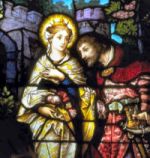Catholic Dictionary
Find accurate definitions of over 5,000 Catholic terms and phrases (including abbreviations). Based on Fr. John Hardon's Modern Catholic Dictionary, © Eternal Life. Used with permission.
Random Term from the Dictionary:
PETER
The first Pope and leader of the Apostles. His original name was Simon, but Jesus gave him the name "Peter," which is Greek, or "Cephas," which is the Aramaic equivalent. "Peter" and "Cephas" mean "the rock" (John 1:42). Such a name was appropriate to the strong character of the man, but the name became a supremely significant metaphor when Christ later made the dramatic assignment, "You are Peter and on this rock I will build my Church" (Matthew 16:18). What made the name distinctive as well was that neither "Peter" nor "cephas" was ever used as a man's name. It was a career designation. There could be not question about the recognition of Peter's leadership. His name always appeared first in the listing of the Apostles (Mark 3:16). He and his brother were the first chosen. His name appears in the Gospels oftener than that of any other Apostle (Luke 5:10). He acted as their spokesman and whenever Jesus questioned them Peter responded in their behalf. He was present at the Transfiguration (Matthew 17:1-8). He was with Jesus when he raised Jairus' daughter (Luke 8:51). He was in Gethsemane during the Lord's agony (Mark 14:33). Jesus paid the temple tax for himself and Peter (Matthew 17:24-27). When Jesus disappeared from Capernaum, it was Peter who led the disciples in pursuit (Mark 1:36). It was Peter who objected to the washing of the feet (John 13:6-9). The angel in announcing the Resurrection said, "Go and tell the disciples and Peter" (Mark 16:7). Other instances from all four Gospels could be cited that make it clear that Peter's leadership was uncontested. After the Crucifixion it was Peter who directed the meeting to select a successor to Judas (Acts 1:15-26). When Paul and Barnabas attended the first council in Jerusalem, Peter presided and made the speech that silenced discussion (Acts 15:6-12). Through the earlier chapters of Acts he continues to exercise the leadership role. He was truly obeying the Master's valedictory injunction to "feed my lambs" and "feed my sheep" (John 21:16-17). Peter revealed human shortcomings as well as strengths. He was rebuked by Jesus for misinterpreting the Messianic mission (Mark 8:33). His impetuosity was revealed in the garden when he attacked Malchus (John 18:10). He was bitterly ashamed of the cowardice he revealed in denying Jesus in the courtyard (Luke 22:54-62). But none of these human actions reduce the significance of the assignment he received when Jesus said, "I will give you the keys of the kingdom of heaven" (Matthew 16:19). (Etym. Greek petros, masc. name formed from the fem. noun petra, rock.)






